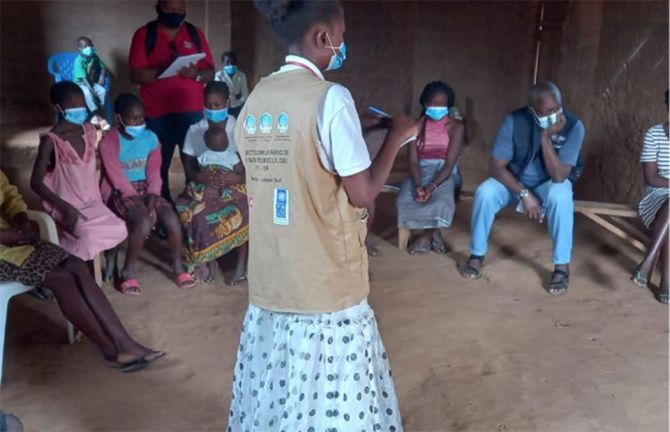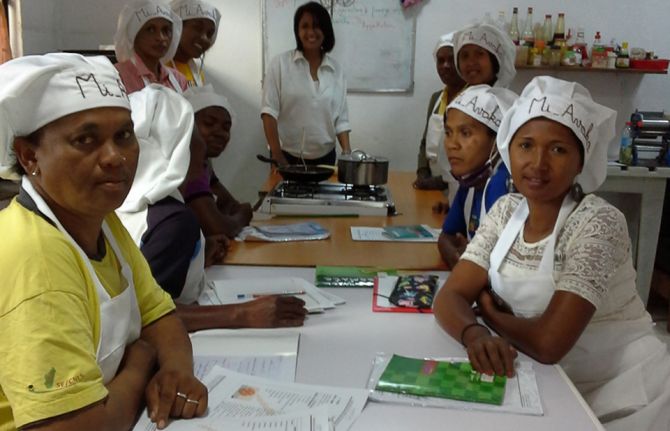
Feature Story
Eminent African Jurists discuss HIV and the law
14 Diciembre 2009
14 Diciembre 2009 14 Diciembre 2009Some 30 judges from the highest national and regional courts from 15 countries in sub-Saharan Africa met in South Africa on 10-12 December to discuss the role of the judiciary in the AIDS response.
The meeting, convened by the Joint United Nations Programme on HIV/AIDS together with the United Nations Development Programme, the International Association of Women Judges and the International Commission of Jurists included discussions around the latest scientific and juridical developments relevant to the legal response to HIV. In addition to the judges, participants included people living with HIV, representatives of sex workers and men who have sex with men, members of regional parliamentary institutions and non-governmental organisations working on HIV and the law in the region.
The meeting was also convened to respond to concerns that national law and law enforcement across the African continent do not consistently protect people most at risk of HIV infection and those living with HIV.
Across Africa, laws exist today that fuel discrimination, prevent effective national responses to HIV and violate human rights.
UNAIDS Executive Director, Michel Sidibé
“Across Africa, laws exist today that f uel discrimination, prevent effective national responses to HIV and violate human rights,” said Michel Sidibé, Executive Director of UNAIDS who delivered the keynote address at the meeting. “Countries must use their legal systems to protect people most vulnerable to HIV and ensure they have access to essential HIV services.”
During the meeting the judges agreed upon a statement of principles aimed at guiding and inspiring members of the judiciary throughout Africa in the context of the epidemic. The statement of principles addresses the following issues: i) the role of the law in responding to the HIV epidemic; ii) Science and evidence-informed decision making; iii) stigma and discrimination; iv) protecting and empowering women: the links between HIV, gender based violence and property rights; v) protecting and empowering marginalised and criminalised communities; vi) ensuring proper application of criminal law; and vii) court proceedings and access to justice.
Over the past 25 years, knowledge about HIV and how to prevent and treat it has evolved significantly within scientific, medical, epidemiological, social and economic disciplines and many important HIV related human rights and legal commitments have been made. However, national law and law enforcement have not always kept pace with these developments and in some cases have even worked against them.
Judges have a key role to play in ensuring that the rights of people living with and vulnerable to HIV are upheld.
Justice Georgina T. Wood, Chief Justice of Ghana
Some interpretation of the law relevant to HIV is still based on outdated paradigms that were formed prior to the availability of HIV treatment which has enabled people living to lead long and productive lives. Recent studies also demonstrate that the risk of transmission is considerably reduced if people living with HIV are following a correct and consistent antiretroviral treatment regimen and do not have other sexually transmitted diseases.
Of particular concern is the recent trend in Africa towards the overly broad criminalisation of HIV transmission and exposure and over the criminalisation of people most affected by HIV, such as men who have sex with men, sex workers, and people who use drugs.
“Criminalisation is radically incompatible with a public health strategy that seeks to encourage people to come forward to find out their HIV status,” said Justice Cameron, a Judge on the Constitutional Court of South Africa.
On a positive note, in some countries, jurisprudence relating to HIV has had a transformative and beneficial impact on the national AIDS response and on public perception of HIV. This includes judgments that declare that discrimination in employment, access to education, medical insurance is unlawful, as well as those that assert the rights to confidentiality and access to medicines for all including prisoners.
At the meeting, participants further discussed the importance of the leadership role of the judiciary in upholding human rights for all, filing against bad laws, ensuring access to the courts for the most vulnerable and giving meaning to constitutional protection in peoples’ everyday lives.
Justice Georgina T. Wood, Chief Justice of Ghana stressed that, “Judges have a key role to play in ensuring that the rights of people living with and vulnerable to HIV are upheld.”
Eminent African Jurists discuss HIV and the law
Cosponsors:
Partners:
International Association of Women Judges
International Commission of Jurists
Press centre:
Press Release: Eminent African Jurists discuss HIV and the law (14 Dec 2009)
Laws that criminalize groups and behaviours threaten to jeopardize universal access to HIV prevention, treatment, care and support (01 Dec 2009)
Experts call for strengthened legal services to fight HIV discrimination in Asia Pacific (08 Aug 2009)
Speeches:
Michel Sidibé, Executive Director of UNAIDS: Jurists, Justice and AIDS
Feature stories:
Experts call for strengthened legal services to fight HIV discrimination in Asia Pacific (08 Aug 2009)
Landmark Delhi High Court decision recognizes inappropriate criminalization as a barrier to health, human rights and dignity (07 July 2009)
Contact:
Chiara Frisone
Tel. +27 11 517 1515
Tel. +27 828 804 729
E-mail:
frisonec@unaids.org
Publications:
Statement on Criminalization of HIV Transmission and Exposure (pdf, 270 Kb.)
Related
 Review recommends law reform on HIV testing to help Angola reduce new HIV infections among young people and ensure treatment
Review recommends law reform on HIV testing to help Angola reduce new HIV infections among young people and ensure treatment

11 de mayo de 2022
 Social enterprises and financial saving supporting Madagascan sex workers through COVID-19
Social enterprises and financial saving supporting Madagascan sex workers through COVID-19

15 de marzo de 2022
 The case for anti-discrimination legislation in Jamaica
The case for anti-discrimination legislation in Jamaica

01 de marzo de 2022
